Biden speech to Congress: What has he achieved in 100 days?
- Published

Biden's first 100 days have been a glass half full/half empty sort of affair.
By one measure, the Democratic president is doing quite well. He and his allies in Congress have passed a coronavirus relief package and are making progress on a second massive bill - a multi-trillion-dollar spending package of what the administration broadly defines as "infrastructure".
Public opinion polls show Biden has the support of a majority of the American public, well ahead of where Donald Trump was at this point in his presidency. Biden has managed to fill his top Cabinet appointments with only a few hiccups, and he's made a few new judicial picks, as well.
For many Americans, his slow-but-steady approach to governing is providing a welcome break from the nonstop drama of Donald Trump's presidency.
As for the empty part of the glass, Biden's approval rating is relatively low by historical standards. If he had a political "honeymoon", it was a staycation not a grand tour.
Despite talk of bipartisanship, unity and ending "this uncivil war", his legislation has yet to receive any support from Republicans in Congress. His immigration policies have been haltingly implemented and are taking hits from the right and the left. The path ahead on liberal priorities like healthcare, education and gun control is uncertain.
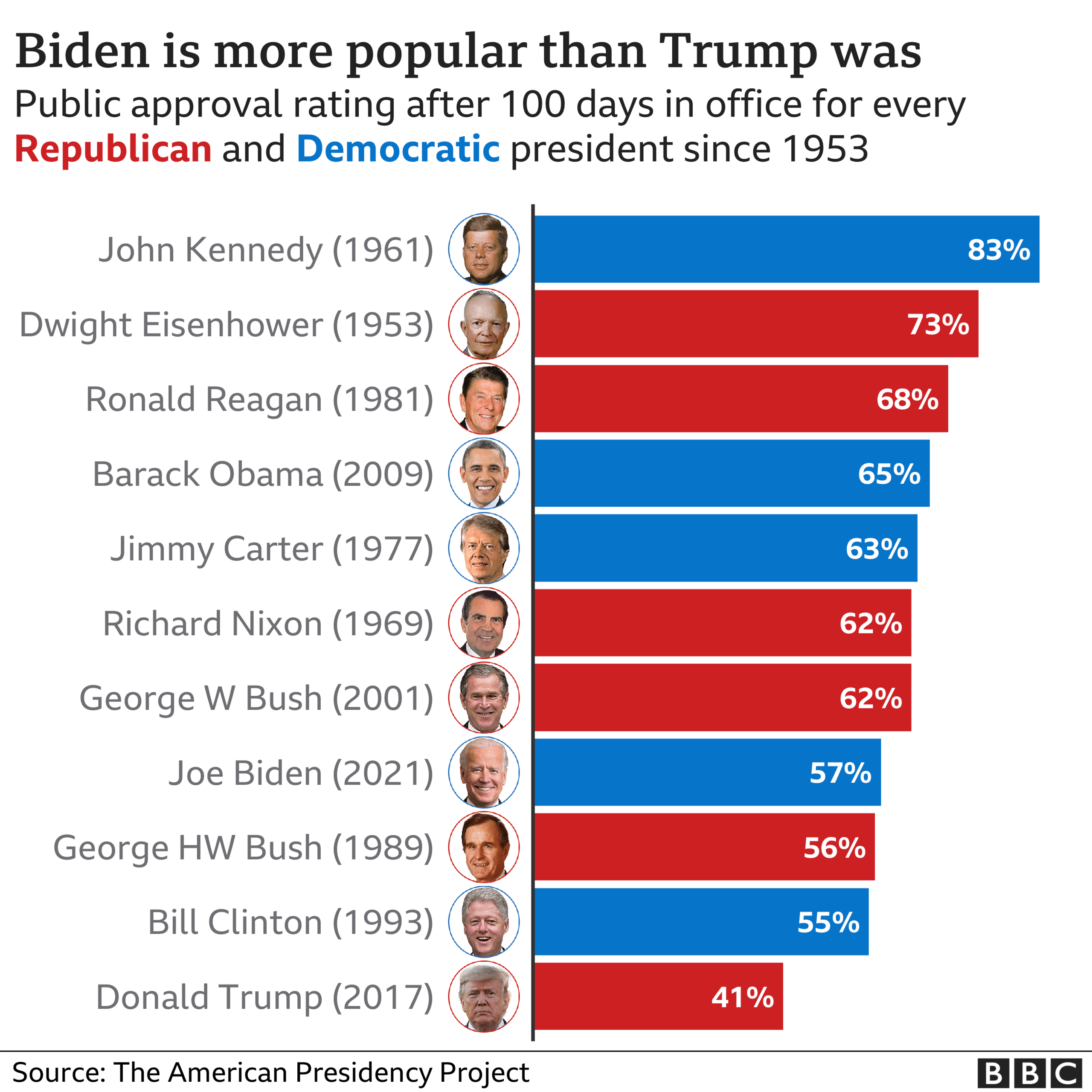

The Biden presidency is still in its infancy, but the 100-day mark is a traditional opportunity to take stock of how a new administration is performing under stress. Here's a look at what he's done so far.
Coronavirus
If there was one issue Joe Biden would be judged on above all else during his first 100 days, it's his handling of the coronavirus pandemic.
American deaths from Covid-19 were frequently topping 3,000 a day when Biden took office. The current seven-day average is 707 and falling. That's largely a testament to the effectiveness of the administration's rollout of vaccines.
Has Biden unified the country? Watch as Americans weigh in.
Biden originally promised 100 million jabs in his first 100 days - a relatively low bar given the existing pace. At this point, the US has exceeded 200 million, with roughly 52% of the US adult population having received at least one dose.
When Biden took office, vaccine distribution was largely being handled by individual states - and like testing and protective-gear distribution during the Trump administration - that produced mixed results.
The Democrats took a much more involved approach and, along with a surge of federal funds from Covid aid bills passed in December and February, the results have been one of the world's best vaccination efforts.
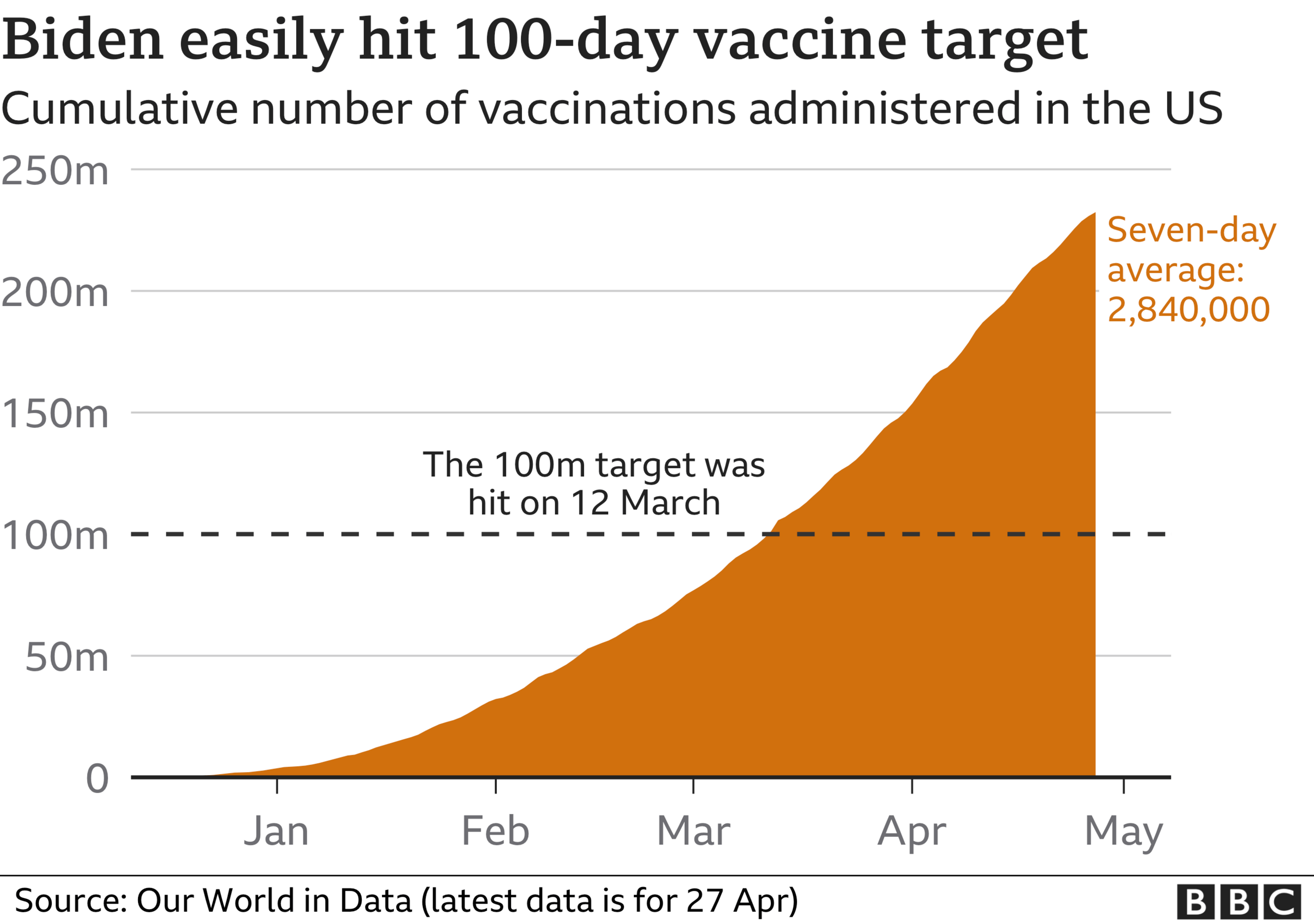

The Biden administration now faces of the challenge of winding down mitigation efforts and convincing reluctant Americans to also get the jab. That will present its own political, and public-health, challenges. But in his first 100 day Biden passed his first, most important test.
Economy
If dealing with the health aspects of the coronavirus pandemic was the first major challenge of Biden's presidency, addressing its economic consequences has been the second. As vaccinations rise and Covid-19 deaths drop, public opinion polls are now showing a plurality of Americans rank the economy as their top issue.
Biden took over the presidency with a nation on the rebound from the depths of 2020's lockdown-induced economic contraction. Since then, the administration - and Democrats in Congress - have shoveled a massive amount of government funds to ensure that the growth continues. The $1.9tn aid package passed in February included direct payments to many Americans, extended unemployment benefits, funds for businesses and state governments, and child-aid support that is estimated to reduce the youth poverty rate in the US by half.
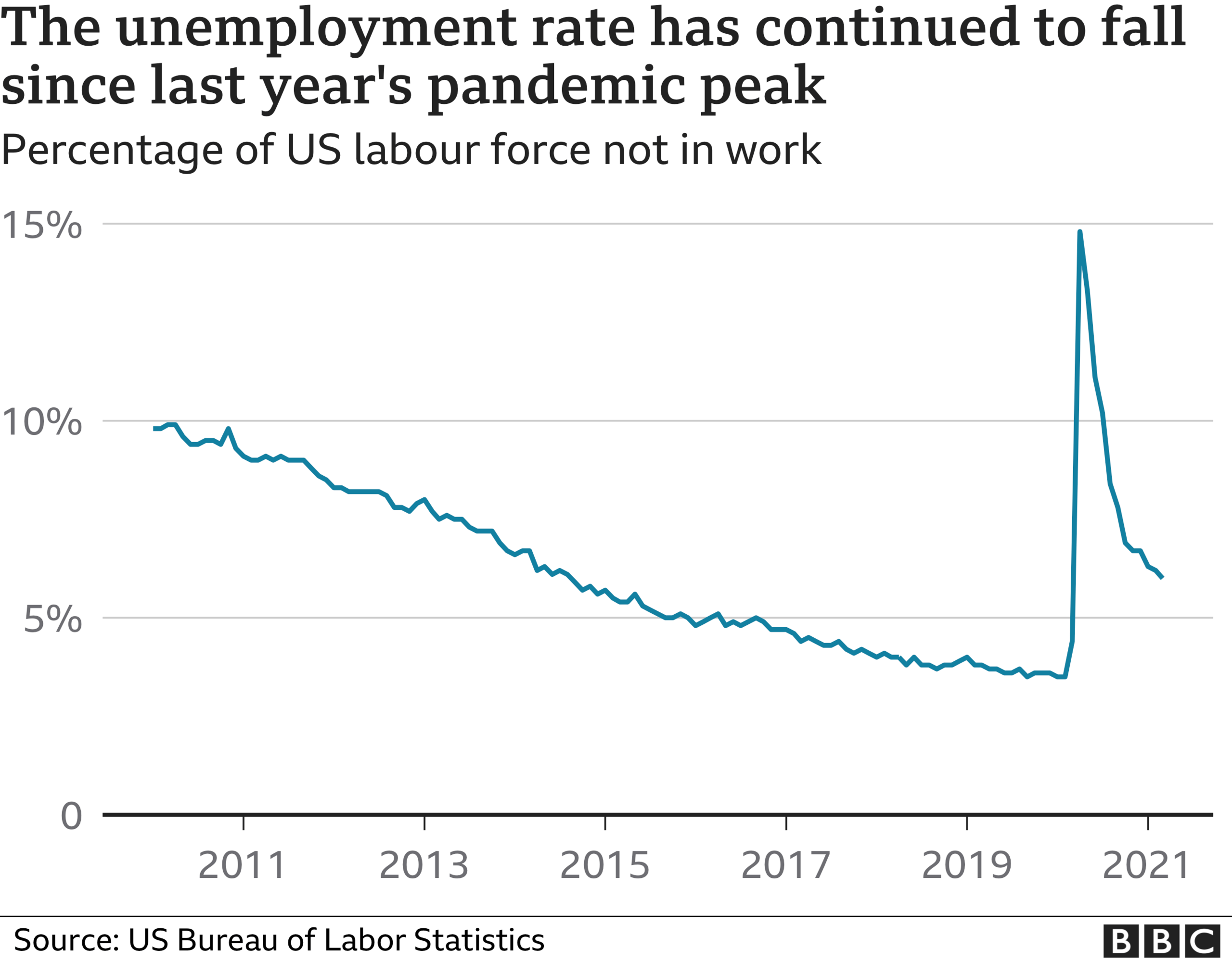

Economists predict US growth in 2021 could approach 6% - a level not seen since the 1980s. There is even some concern that the economy could grow too fast, raising the spectre of runaway inflation. The growing income inequality exacerbated by the pandemic will also have long-term consequences that could threaten Biden's political standing.
For the moment, however, unemployment is dropping, businesses are reopening and the stock market is rising. This is all good news for the president.
Immigration
If facing the public-health and economic consequences of the coronavirus pandemic were the two most obvious challenges facing Biden in his first 100 days - the "known knowns", as former Defence Secretary Donald Rumsfeld once put it - immigration has been the surprise crisis.
It is one for which the Biden team has not been fully prepared.
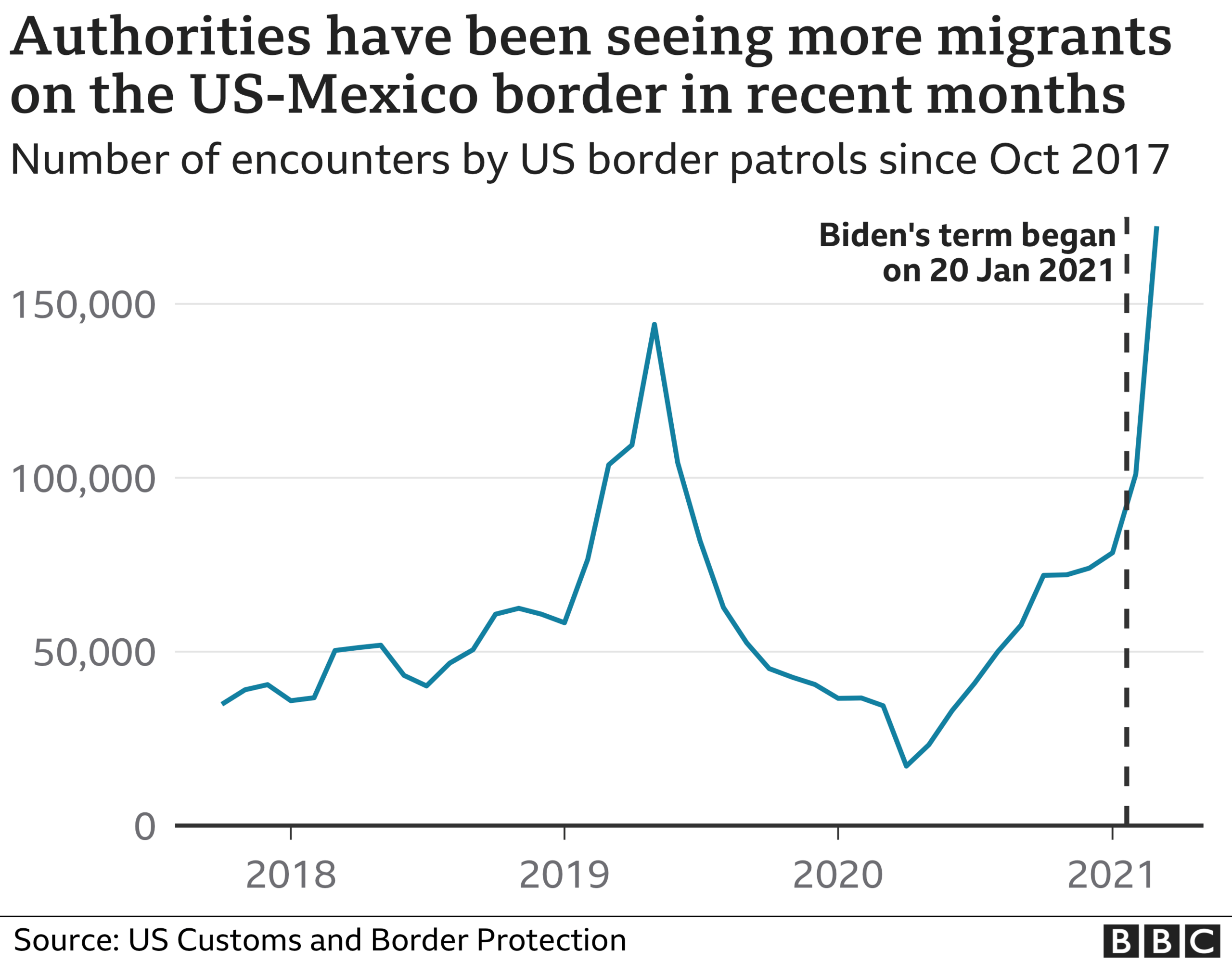

Due to a combination of Covid-depressed movement in 2020, a perception among Central American migrants that the Biden administration would be more welcoming and a new policy of admitting most unaccompanied minors who cross the US-Mexico border, the number of undocumented migrant attempting to enter the US from Mexico has surged to record levels.
US border processing facilities, which the Biden administration says were neglected during the Trump years, have been overwhelmed.
Meanwhile, Biden is facing growing anger from the political left over his unwillingness to raise the cap for refugee resettlement from 15,000 to 125,000. After initially saying that the Trump-era number would remain in effect for the rest of the year, the White House quickly changed tack and said a new, higher figure would be announced in May.
That may not be enough to satisfy immigration activists who, while pleased that Biden has rescinded many of the more draconian entry and enforcement rules from the previous administration, want all the Trump-era policies undone. And if the migrant surge does not subside - and it begins affecting life in border communities and dominating the headlines - the political headaches for the Biden administration will grow.
Environment
Over the course of his presidential campaign, Biden underwent a remarkable transformation from a modest advocate for environmental regulation to an outspoken proponent of aggressively addressing the threat of climate change.
Part of this may have been political expediency, as Biden sought to bolster support from younger voters who were initially cool on his presidential bid. As president, however, Biden has continued his push for substantive environmental policy reform.
He quickly rejoined the Paris Climate Accord, cancelled construction of the Keystone XL oil pipeline and began the process of reinstating regulations that were rolled back during the Trump presidency. Last week, he pledged to cut US carbon emissions 50% below 2005 levels by 2030. His international "climate summit" may have been heavy on rhetoric and low on substance, but it represents his first effort to position the US as a leader on global environmental policy.
Perhaps Biden's most significant environmental efforts, however, are buried deep within the $2tn infrastructure package that has become the administration's top legislative priority. Biden's proposal includes hundreds of billions of dollars for clean power generation, energy-grid improvements, support for electric vehicles, fossil-fuel site clean-up and climate research.


As with the Covid relief package, Biden is using massive spending bills presented as focusing on popular issues to usher in wide ranging of policy changes that might be more controversial if addressed individually.
"Green New Deal" advocates have already called Biden's climate spending insufficient, but it still marks one of the most ambitious efforts by a president to date.
Foreign policy
Biden began his presidency pledging to move the nation away from Trump's "America first" foreign policy, which frequently eschewed international alliances in favour of a go-it-alone approach.
His most noteworthy international undertaking in his first 100 days, however, may be the culmination of a US withdrawal from Afghanistan that was started during the Trump presidency.
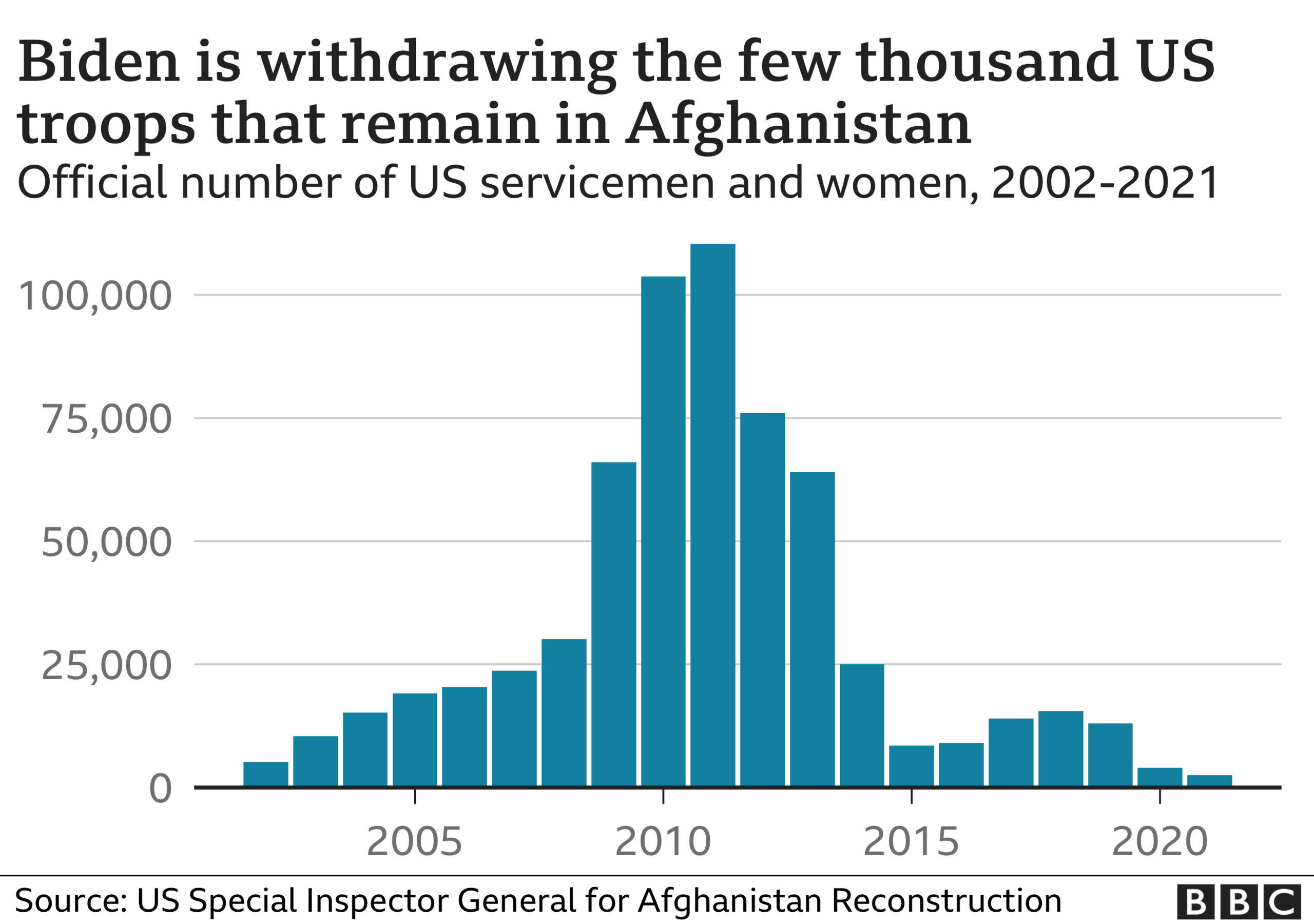

Although he missed 1 May mark for a negotiated pullout from the nation after 20 years of US occupation, the final process has been set in motion.
Biden has also been slow to return to the negotiating table with Iran, after Trump withdrew the US from the nuclear agreement negotiated while Biden was vice-president. Once again, it's not the hairpin policy turn from the Trump years that some were predicting.
Biden has taken a harder line toward Russia than his predecessor, imposing new banking sanctions that may have a bite if strengthened further. His State Department team engaged in verbal sparring with a Chinese delegation over human rights violations. On the whole, the Biden administration appears to be repositioning itself to work with allies to prepare for what the president views as a looming global contest between the world's democracies and authoritarian governments.
For Biden's first 100 days, however, most of this has been talk, as the administration conducts "reviews" and "assessments" in advance of new policies being announced.
Trade
In the decades before Trump won the presidency, it was the accepted wisdom among leaders of both parties that free trade was a net positive for the US and multilateral international agreements were an efficient way to open markets and boost commerce.
George HW Bush championed Nafta. Bill Clinton helped birth the World Trade Organization. George HW Bush expanded free trade to Central and South America. Barack Obama negotiated the Trans-Pacific Partnership.
A look back at Joe Biden's life and political career
Trump shredded or refashioned them all, opting to use tariffs and the threat of trade reprisals as a tool to advance US economic interests.
Perhaps surprisingly Biden - a veteran politician and defender of the old international order - has done little in his first 100 days to reverse Trump's changes. The Chinese tariffs are still on the books, and Biden reimposed a tariff on UAE aluminum Trump lifted on his last day in office.
While the Biden administration has eased some tariffs on EU and UK goods, such as Scotch whiskies, it has also warned that it might follow through on a Trump administration threat to put a tariff on British goods in retaliation for a UK tax on tech firms.
The era of free trade may not be over, but Trump made tariffs a more frequent tool for economic policy - and it's a tool Biden seems reluctant to abandon.
Graphics by Mike Hills
- Published3 June 2019
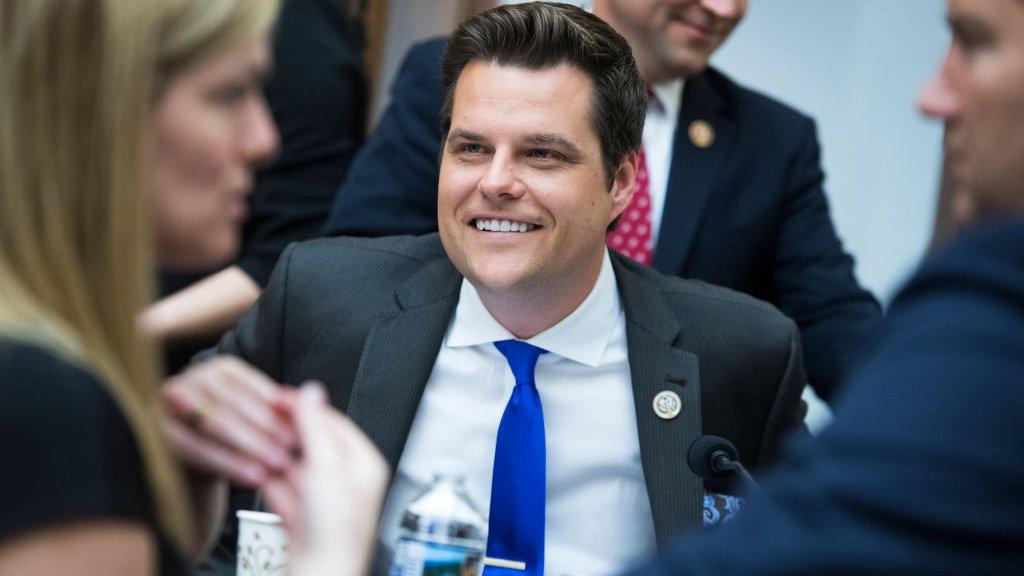
- Published1 March 2021
- Published18 March 2021
- Published13 July 2021
- Published28 January 2021
